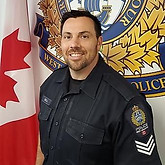LEADS SCHOLARS CANADA
The Scholars
2020

Nick Bell
West Vancouver Police Service
Nick has taken part in a number of research projects at the local, national, and international levels. Most recently, Nick has partnered with New York University in several randomized control trials related to crime prevention and police response. Nick is currently researching Neighbourhood Watch, specifically examining how the expansion of Neighbourhood Watch impacts crime and a sense of safety. Nick's research interests are in the area of evidence-based decision making, crime prevention, and community engagement with police.

John Ng
Saskatoon Police Sevice
John is a divisional crime analyst and has been a law enforcement analyst for nearly ten years. Ng is a certified and active member of the International Association of Crime Analysts (IACA). He volunteered with the former IACA Methods Subcommittee, in which he co-authored a handful of technical papers on analytical methods. These methods included hotspot analysis, prioritizing offenders, and social network analysis. Ng currently volunteers with the IACA Publications Committee.
2019

Rich Johnston
Barrie Police Service
Rich has taken part in a number of research projects at the local, national, and Rich Johnston is an Inspector with the Barrie Police Service who has been responsible for integrating EBP into that service. Last year, he began a partnership with BetaGov to conduct a randomized controlled trial (RCT) in the Barrie Police Service, making it one of the first agencies in Canada to run its own RCT. Rich’s efforts were integral in expanding the LEADS program internationally. He holds a master’s in leadership studies from the University of Guelph.

Paul Ladouceur
Estevan Police Service
Paul Ladouceur is the Chief of Police with the Estevan Police Service, which was the first Saskatchewan-based department to join Can-SEBP. Paul is a recent master's graduate and was a keynote speaker at a recent Can-SEBP event in Saskatoon to discuss his work and views on evidence-based policing and why his own service has adopted this approach.

Stan Maclellan
Durham Regional Police Service
Stan MacLellan is the Chief Administrative Officer for the Durham Regional Police Service, whose responsibilities include oversight of the department’s in-service training. He has worked for two of Ontario's larger police services and has expertise across a broad range of policing issues. He is working towards his doctorate in Policing and Security at Charles Sturt University and holds a bachelor’s from St. Francis Xavier University and an MBA from Queen’s University. He is an executive member of the Can-SEBP.
The Projects

Nick Bell
West Vancouver Police Service
Nick is currently working with BetaGov running a randomized controlled trial aimed at reducing bike thefts.

Rich Johnston
Barrie Police Service
Rich just completed a study that challenges the conventional wisdom that crime increases on nights with a full moon.
Other studies:
The effectiveness of focused policing to reduce accidents and increase safety: A RCT was conducted using the most prevalent locations in Barrie for motor vehicle and pedestrian collisions. The treatment area had randomly present (during peak accident hours) marked uniform police vehicles, with emergency lights activated, stationary in or adjacent to the location. The control location received no increased police presence unless an accident occurred and required a police presence. The treatment was an 11-15 minute presence twice a day – Monday through Friday. The experiment's length was 3 months. The results show no appreciable decline or change in the number or accident between vehicles and pedestrians.
Situation tables: Currently finishing up a 1 year RCT evaluating the ‘Collaborate Barrie’ situation table. Individuals that were deemed eligible (adults that were being brought forward not on consent) were randomly assigned the treatment group (referred to the table) while those in the control group were given the historic response by participating agencies. The RCT will follow the subjects for an additional 6 months to determine organizational specific service use and incidents with both groups of participants.
Junior Constable Camp: The Barrie Police run a one week camp with local at ‘risk’ children. The study was a review of all children who were eligible to attend camp based on 9 risk categories. The review looked at all those who were eligible that did not attend versus those who did. Contact with the Criminal Justice System and the Barrie Police Service were the criteria for the review.
Monitoring perpetrators of domestic violence: This RCT will focus on recidivist domestic abusers currently ‘on charge’ and out on release with ‘street enforceable’ conditions. The treatment group will be assigned to officers for compliance with release condition checks versus the control group that will not receive any increased attention. The frequency of contact will be once a week until 1 year. The frequency of domestic-related and other criminal behaviour will be the focus of the RCT.
Peer-evaluation: This RCT is a two-stage experiment. During the first stage, a single eligible unit was selected to participate in peer evaluations. In the RCT, the treatment group is provided with both traditional (supervisor only) reviews as well as peer reviews of their performance. The control group was provided on the traditional reviews. The second stage of this RCT will involve peer review specific training and the inclusion of multiple eligible units. The purpose of the RCT is to determine if there is any increased ‘value’ in the participation and receipt of the review by participants versus the current practice.
Impaired Driving: This RCT will leverage hotspots for impaired driving using currently held data. Treatment determined locations will be exposed to focused attention during data determined high peak times versus the control group that will receive no altered focus. The increased focus will be for a 6 month period. A review of the prevalence of impaired driving in both locations post-experiment will then take place to ascertain any relationship to increased enforcement.

John Ng
Saskatoon Police Service
John is working with researchers at Western University to improve understanding of how to study 'disorder' using police data as the first step to a larger project tracking crime and disorder following the implementation of a supervised injection site.
John has also begun work with Chris O'Connor (UOIT) on a data quality project. He is also working with Rich Johnston at Barrie PS to study how weather factors affect auto thefts.
Papers & Presentations


John Ng - Crime Analyst at Saskatoon Police Service & newly appointed Chair of IACA’s Publication Committee – visits the NIRO Knowledge Podcast to chat about the relationship between crime analysis and EBP and how analysts can get involved.
Check it out here.




